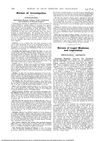 97 citations,
October 2019 in “Journal of Translational Medicine”
97 citations,
October 2019 in “Journal of Translational Medicine” A very low-calorie ketogenic diet is effective for quick weight loss and improving health in obese patients, with careful management of side effects and maintenance.
 5 citations,
July 2017 in “Women & Health”
5 citations,
July 2017 in “Women & Health” Nursing women in the West Bank with higher income and non-smoking habits have higher blood zinc levels.
 14 citations,
November 2015 in “Annals of the New York Academy of Sciences”
14 citations,
November 2015 in “Annals of the New York Academy of Sciences” Changing the diet of mice lacking the enzyme CBS can affect symptoms related to the genetic condition.
 18 citations,
April 2013 in “Inflammatory Bowel Diseases”
18 citations,
April 2013 in “Inflammatory Bowel Diseases” People with Inflammatory Bowel Disease often lose hair due to stress, medication side effects, or lack of nutrients, and treatment depends on the specific cause.
 374 citations,
May 2016 in “The Lancet. Diabetes & endocrinology”
374 citations,
May 2016 in “The Lancet. Diabetes & endocrinology” Cushing's syndrome can cause serious health problems, and early treatment is crucial, but some issues may remain after treatment.
November 2019 in “BMC veterinary research” The hair loss in Belgian Blue crossbred calves was caused by a diet issue, not by disease or infection.
 45 citations,
January 1998 in “Dermatology”
45 citations,
January 1998 in “Dermatology” Some skin conditions look like acne but are caused by drugs, and they usually get better when the drug is stopped.
 1 citations,
March 2023 in “Nutrients”
1 citations,
March 2023 in “Nutrients” The conclusion is that obesity should be managed with a slow, balanced approach to diet and exercise, with medication and surgery as additional options, and education and access to care are important.
 254 citations,
September 2014 in “Menopause”
254 citations,
September 2014 in “Menopause” The NAMS 2014 recommendations guide healthcare providers on treating health issues in midlife women, emphasizing individualized care and informed decision-making.
April 2019 in “Journal of the Endocrine Society” An over-the-counter vitamin/mineral supplement improved hair loss and blood sugar control in a woman with non-classic 11-hydroxylase deficiency.
 3 citations,
March 2022 in “International Journal of Trichology”
3 citations,
March 2022 in “International Journal of Trichology” Special supplements with collagen, vitamins, and minerals can help treat hair loss.
 400 citations,
January 2014 in “British Journal of Sports Medicine”
400 citations,
January 2014 in “British Journal of Sports Medicine” The consensus provided guidelines for treating the Female Athlete Triad and a system to decide when athletes can return to sports.
 February 2023 in “Aesthetic Cosmetology and Medicine”
February 2023 in “Aesthetic Cosmetology and Medicine” Medicinal plants in nutricosmetics contain compounds that can improve skin and hair health.
 66 citations,
June 2018 in “British Journal of Dermatology”
66 citations,
June 2018 in “British Journal of Dermatology” European guidelines recommend regular eye and ear exams, skin care, vitamin D supplements, and cautious use of medications for managing congenital ichthyoses.
 February 2018 in “Egyptian Journal of Radiation Sciences and Applications”
February 2018 in “Egyptian Journal of Radiation Sciences and Applications” Patients with Discoid Lupus Erythematosus have lower vitamin D and antioxidant levels and higher oxidative stress.
 November 2024 in “Skin Appendage Disorders”
November 2024 in “Skin Appendage Disorders” Misinformation about alopecia can lead to poor treatment, so it's important for healthcare professionals to correct myths.
 5 citations,
May 2023 in “Frontiers in immunology”
5 citations,
May 2023 in “Frontiers in immunology” Environmental factors like diet and vitamin levels, especially Vitamin D, can affect autoimmune diseases differently, with lifestyle changes potentially improving outcomes.
 10 citations,
July 2018 in “Our Dermatology Online”
10 citations,
July 2018 in “Our Dermatology Online” Some vitamins and minerals are important for preventing hair loss, but treating hair loss with them without a known deficiency is not proven effective.
 5 citations,
December 1942 in “Journal of the American Medical Association”
5 citations,
December 1942 in “Journal of the American Medical Association” Choline and biotin are important for liver health and preventing certain deficiencies in animals, and more research is needed to understand their benefits in humans.
188 citations,
January 2003 in “Recent results in cancer research/Recent Results in Cancer Research” Vitamin D is essential for bone health and may reduce risks of several diseases.
 11 citations,
October 2015 in “Journal der Deutschen Dermatologischen Gesellschaft”
11 citations,
October 2015 in “Journal der Deutschen Dermatologischen Gesellschaft” Women who had bariatric surgery risk nutritional deficiencies causing skin issues during pregnancy and breastfeeding.

Good nutrition may help prevent premature hair graying.
 1 citations,
February 2021 in “Animal feed science and technology”
1 citations,
February 2021 in “Animal feed science and technology” Organic selenium may offer better retention and less waste in puppies.
 June 2015 in “Biomedical and biopharmaceutical research”
June 2015 in “Biomedical and biopharmaceutical research” The congress showed advancements in skin hydration, barrier function, and safe, effective new cosmetic formulations.
 6 citations,
June 2018 in “Journal of pediatric endocrinology & metabolism/Journal of pediatric endocrinology and metabolism”
6 citations,
June 2018 in “Journal of pediatric endocrinology & metabolism/Journal of pediatric endocrinology and metabolism” Patients with the same genetic mutation for vitamin D-resistant rickets showed different symptoms but all improved with treatment except for hair loss.
 277 citations,
July 2002 in “Molecular Endocrinology”
277 citations,
July 2002 in “Molecular Endocrinology” Removing part of the vitamin D receptor stops vitamin D from working properly.
 August 1946 in “Journal of the American Medical Association”
August 1946 in “Journal of the American Medical Association” Companies agreed to stop making false health claims about their products.
 March 2024 in “Journal of functional foods”
March 2024 in “Journal of functional foods” Collagen peptides from marine and bovine sources may help prevent hair loss by affecting hair follicle stem cells differently.
 27 citations,
September 2017 in “Journal of Medicinal Food”
27 citations,
September 2017 in “Journal of Medicinal Food” Annurca apple supplement safely increases hair growth and keratin in humans.

Selenium can be toxic to animals, causing serious health issues, especially in horses.


























